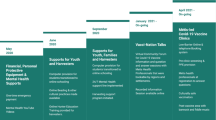Abstract
A worldwide increasing trend toward vaccine hesitancy has been reported. Measles outbreaks in southern Africa in 2009–2010 were linked to objections originating from Apostolic gatherings. Founded in Zimbabwe in the 1950s, the Apostolic church has built up a large number of followers with an estimated 3.5 million in Zimbabwe in 2014. To inform planning of interventions for the 2015 measles–rubella vaccination campaign, we assessed vaccination status and knowledge, attitudes and practices among purposive samples of Apostolic caregivers in three districts each in Harare City, Manicaland and Matabeleland South in Zimbabwe. We conducted structured interviews among 97 caregivers of children aged 9–59 months and collected vaccination status for 126 children. Main Apostolic affiliations were Johanne Marange (53%), Madida (13%) and Gospel of God (11%) with considerable variation across assessment areas. The assessment also showed considerable variation among Apostolic communities in children ever vaccinated (14–100%) and retention of immunization cards (0–83%) of ever vaccinated. Overall retention of immunization cards (12%) and documented vaccination status by card (fully vaccinated = 6%) were low compared to previously reported measures in the general population. Mothers living in monogamous relationships reported over 90% of all DTP-HepB-Hib-3, measles and up to date immunizations during the first life year documented by immunization card. Results revealed opportunities to educate about immunization during utilization of health services other than vaccinations, desire to receive information about vaccinations from health personnel, and willingness to accept vaccinations when offered outside of regular services. Based on the results of the assessment, specific targeted interventions were implemented during the vaccination campaign, including an increased number of advocacy activities by district authorities. Also, health workers offered ways and timing to vaccinate children that catered to the specific situation of Apostolic caregivers, including flexible service provision after hours and outside of health facilities, meeting locations chosen by caregivers, using mobile phones to set up meeting locations, and documentation of vaccination in health facilities if home-based records posed a risk for caregivers. Coverage survey results indicate that considerable progress has been made since 2010 to increase vaccination acceptability among Apostolic communities in Zimbabwe. Further efforts will be needed to vaccinate all Apostolic children during routine and campaign activities in the country, and the results from our assessment can contribute toward this goal.
Similar content being viewed by others
Notes
Third vaccine dose against diphtheria, tetanus, pertussis, hepatitis B and haemophilus influenzae type B.
Vaccinated with Bacille Calmette-Guerin (BCG) vaccine, three doses of DTP-HepB-Hib vaccine, four doses of oral polio vaccine and measles vaccine within first year of life.
References
Blumhofer, E. L., & Apostolic Faith Mission, Portland, OR. (2002). In S. M. Burgess (Ed.), The new international dictionary of Pentecostal and charismatic movements, revised and expanded edition (p. 327). Grand Rapids, Michigan: Zondervan Publishing House.
Dubé, E., Laberge, C., Guay, M., Bramadat, P., Roy, R., & Bettinger, J. (2013). Vaccine hesitancy. An overview. Human Vaccines & Immunotherapeutics, 9(8), 1763–1773.
Ha, W., Salama, P., Gwavuya, S., & Kanjala, C. (2014). Is religion the forgotten variable in maternal and child health? Evidence from Zimbabwe. Social Science and Medicine, 118, 80–88.
Jarrett, C., Wilson, R., O’Leary, M., Eckersberger, E., & Larson, H. J. (2015). SAGE Working Group on Vaccine Hesitancy. Strategies for addressing vaccine hesitancy—A systematic review. Vaccine, 33(34), 4180–4190.
Larson, H. J., Caitlin Jarrett, C., Eckersberger, E., Smith, D. M. D., & Paterson, P. (2014). Understanding vaccine hesitancy around vaccines and vaccination from a global perspective: A systematic review of published literature, 2007–2012. Vaccine, 32, 2150–2159.
Machekanyanga, Z., Ndiaye, S., Gerede, R., Chindedza, K., Chigodo, C., Shibeshi, M. E., et al. (2017). Qualitative assessment of vaccination hesitancy among members of the apostolic church of Zimbabwe: A case study. Journal of Religion and Health. doi:10.1007/s10943-017-0428-7.
Ministry of Health and Child Care (MHCC). (2015a). Evaluation of coverage achieved during Zimbabwe measles-rubella and vitamin A catch up campaign combined with assessment of routine immunization. Part I: Measles-rubella vaccine and vitamin A supplementation campaign.
Ministry of Health and Child Care (MHCC). (2015b). Evaluation of coverage achieved during Zimbabwe measles-rubella and vitamin A catch up campaign combined with assessment of routine immunization. Part II: Coverage survey: Routine immunization.
Ministry of Health and Child Care (MHCC) & World Health Organization (WHO). (2010). Report on Zimbabwe 2010 routine immunization coverage survey. Harare, Zimbabwe.
Rainey, J. J., Watkins, M., Ryman, T. K., Sandhu, P., Bo, A., & Banerjee, K. (2011). Reasons related to non-vaccination and under-vaccination of children in low and middle income countries: Findings from a systematic review of the published literature, 1999–2009. Vaccine, 29, 8215–8221.
Shibeshi, M. E., Masresha, B. G., Smit, S. B., Biellik, R. J., Nicholson, J. L., Muitherero, C., et al. (2014). Measles resurgence in southern Africa: Challenges to measles elimination. Vaccine, 32(16), 1798–1807.
The Vaccine Confidence Project (VCP). The State of Vaccine Confidence. (2015). London School of Hygiene and Tropical Medicine. www.vaccineconfidence.org/The-State-of-Vaccine-Confidence-2015.pdf. Accessed July 27, 2016.
WHO IST. (2012). Addressing resistance to immunization. The experience from Southern Africa. Immunisation and Vaccine Development Unit WHO Inter-country Support Team (WHO IST) for Eastern and Southern Africa, Harare, Zimbabwe.
World Health Organization (WHO). (2014). Meeting of the Strategic Advisory Group of Experts on immunization—Conclusions and recommendations. Weekly Epidemiological Record, 89(50), 561–576.
Zimbabwe Demographic and Heath Survey (DHS), Final Report. (2010–11). http://www.dhsprogram.com/pubs/pdf/FR254/FR254.pdf. Accessed July 27 2016.
Author information
Authors and Affiliations
Corresponding author
Ethics declarations
Conflict of interest
The authors have no conflicts to disclose related to this work.
Additional information
Disclaimer: The findings and conclusions in this report are those of the authors and do not necessarily represent the official position of the Centers for Disease Control and Prevention.
Rights and permissions
About this article
Cite this article
Gerede, R., Machekanyanga, Z., Ndiaye, S. et al. How to Increase Vaccination Acceptance Among Apostolic Communities: Quantitative Results from an Assessment in Three Provinces in Zimbabwe. J Relig Health 56, 1692–1700 (2017). https://doi.org/10.1007/s10943-017-0435-8
Published:
Issue Date:
DOI: https://doi.org/10.1007/s10943-017-0435-8




